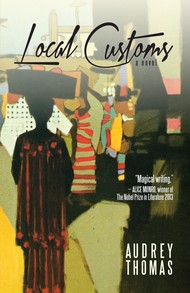Local Customs by Audrey Thomas
I was reminded of the The Mistress of Nothing by Kate Pullinger when reading this book. The heroines of both novels were adventurous Victorian women, who embarked on voyages to exotic locations where they died. In Pullinger’s book, the heroine was a high born English lady, suffering from tuberculosis, who went to Egypt because of the salubrious climate and later died. In Local Customs, Letitia (known as Letty) Landon, an early 19th century English poet, marries the governor of Cape Coast Castle on the Gold Coast of West Africa. She only lasts eight weeks before dying, rather mysteriously.
The author has done meticulous research on the period and the conditions, with a great deal of foreshadowing. Thus the demise of Letty does not come as a surprise to the reader. At the same time, I found the frequent comments about her impending death somewhat excessive.
The author also focuses on a disparate group of characters. Governor George Maclean, a career diplomat, is a rather taciturn Scot. Mr. Thomas Birch Freeman, son of a freed Jamaican slave and an English woman is a righteous Wesleyan missionary intent on converting the natives. Mrs. Bailey acts as Letty’s travelling companion and helper, and Brodie Cruickshank, another Scot who is the governor of a neighbouring area becomes a good friend to Letty. These principal characters and the events, with the possible exception of Mrs. Bailey, were real.
The author evokes the oppressive heat and humid conditions of the area and I certainly felt that I was there. Living in this climate was very difficult and many Westerners didn’t survive, succumbing to malaria, dysentery, and other fevers, and often very quickly after arrival.
I would like to hear Audrey Thomas talk about the research process which she followed in writing this book, as it covers many topics. These include women and their place in the 19th century, especially those who were accomplished and bright but who were not recognized, women writers in the time period, the fate of spinster women, missionaries, religious and cultural assimilation in the British colonies, local superstition and many more.
Reviewed by Hilary Munro


